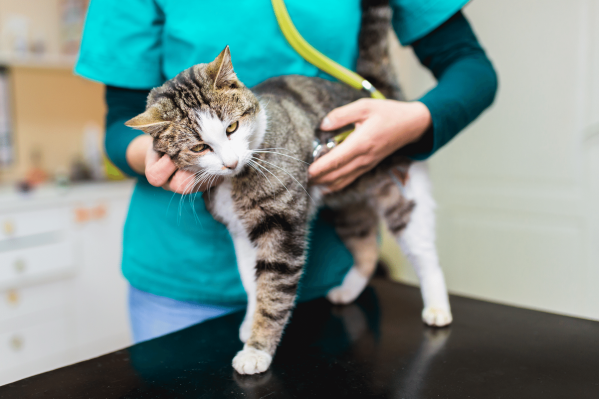Vomiting is relatively common in cats, and as a pet parent, it can be anxiety-inducing when you’re unsure why your feline friend looks or feels unwell. It's necessary to realize that vomiting is a symptom and not a condition in itself, and therefore, has many possible causes. It's important to know when the vomiting is severe enough for you to need to take your cat to the vet to check for more serious causes.
Why is my cat throwing up?
There are several possible causes for vomiting in cats. These include simple things like hairballs, parasites, sudden changes in diet, or a mild stomach upset, to more serious things like toxic ingestion, foreign body obstructions, kidney or liver disease, complicated stomach/bowel inflammation, cancer, blocked bladder, food allergies, diabetes, and hyperthyroidism.
Given the wide range of possible reasons why your cat is throwing up, without the professional help or diagnosis of a trained veterinarian, it can be difficult to figure out the cause.
If there's no clear indication of what's going on or you're concerned the cause might be more serious, talk to a vet professional. They can help you determine what the next best step should be.
To help determine the cause for your cat throwing up, you'll want to observe how often it's occurring. Chronic vomiting in cats means frequent vomiting—three or more times per month for at least three months. Acute vomiting is when a cat who normally isn't prone to vomiting starts throwing up. Both require the care and attention of a veterinary professional, however, the diagnostic tests and treatment between acute and chronic vomiting can be very different, and knowing how often your cat is vomiting can help your vet decide on the next best step.
Should you go to the vet if your cat is throwing up?
In general, if your cat has only vomited one to three times and is otherwise normal, there is a higher likelihood that they do not need urgent care for their condition. If your cat is throwing up more than three times and the vomiting is accompanied by other symptoms, you should see a vet right away. These signs include (but are not limited to):
Straining to urinate
Not eating or drinking
General lethargy
Abnormal vocalizations
Very fast breathing or open-mouthed breathing
Signs of pain
Signs of dehydration
Pale gums
If you suspect your cat is vomiting because they’ve ingested something foreign or come into contact with toxins (like garden lilies), you should see your vet right away.
Treatments for cat vomiting
There is no safe over-the-counter medication to treat vomiting in cats that can be given at home, so any medication will have to be given under the guidance of your veterinarian. Your vet can assess if any medications need to be prescribed and provide careful instruction on how to give the medication to your cat—especially if they’re routinely throwing up food.
If your cat has been vomiting for less than 24 hours and there are no other symptoms, you can withhold food from them for 12 hours to allow the stomach some time to rest and recover (for young kittens you should not withhold food for longer than 4-6 hours). After this period, you can feed a bland diet which is easily digestible. A bland diet usually consists of a single, low-fat protein and a single carbohydrate. An example of this is boiled white meat chicken and rice. Feed small meals about six times per day. This diet can be fed for 2-3 days (24 hours in the case of young kittens), after which you should transition back to their usual diet over 1-2 days. You can add a probiotic for cats to the diet as well to help balance the gut in case of a simple stomach upset.
In addition, make sure you're using regular preventative treatment for parasites as advised by your vet, as parasites can be a cause for vomiting.
If your cat is regurgitating (heaving up undigested food soon after eating)—which is slightly different from vomiting—try feeding them smaller meals or use a slow feeder, as regurgitation can sometimes be a result of simply eating too fast.
If the veterinarian has determined that their food is causing vomiting, any food changes should be done gradually over 5-7 days to ensure the digestive tract has time to adjust so it can digest the food optimally. Start by mixing small amounts of the new food with the previous diet and slowly increase the amount of new food while decreasing the amount of the previous food.
Visible hair in the vomit can be a sign of hairballs being the cause for your cat throwing up. You can speak to your vet about using a specific food or product that helps to eliminate hair from the gut on a regular basis to try to prevent vomiting from hairballs.
At the end of the day, if your cat is experiencing any sort of nausea or vomiting, your best option is to seek professional advice. The team at Pawp is here to help ensure that you're doing the right thing for your cat—chat with us 24/7 about your cat's vomiting or any other concerns you may have.

Reviewed and fact-checked by
Dr. Mari, DVM at Pawp
